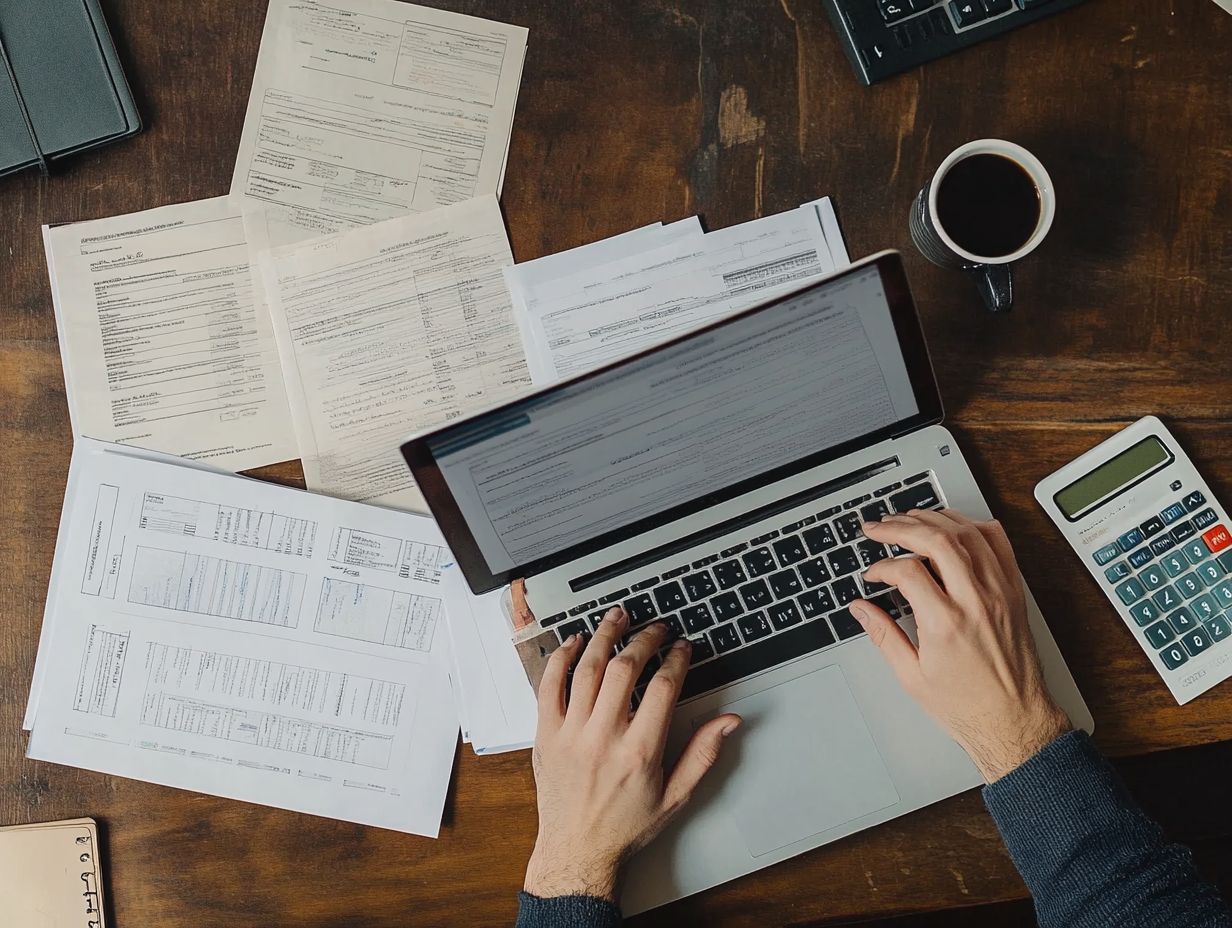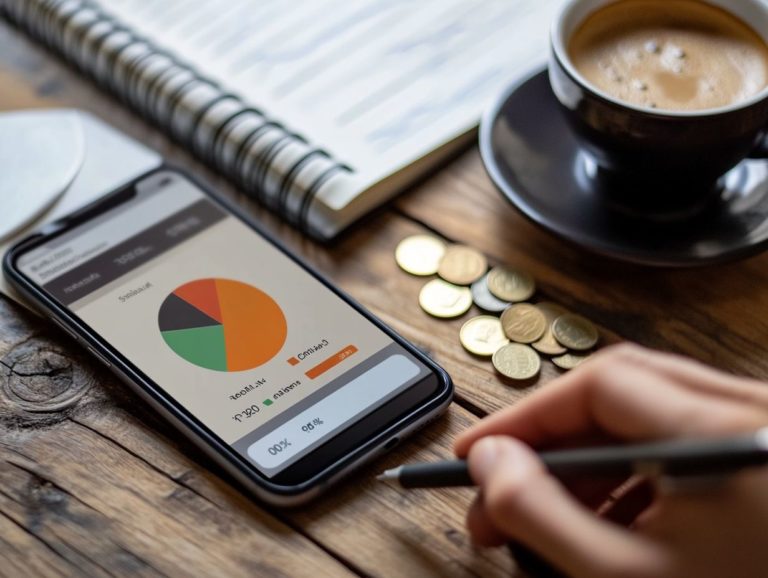How Do I Track My Expenses Accurately?
Want to take charge of your finances? Tracking your expenses is the first step! Tracking expenses is crucial for maintaining your financial health, yet it often gets overlooked until the consequences become unavoidable.
Delve into the advantages of precise expense tracking. Compare traditional manual methods with modern digital tools. Explore the best apps and software that can streamline your financial management, along with effective budgeting tips and common pitfalls you should steer clear of.
Uncover best practices that will help you maintain consistency and accuracy. This ensures you stay firmly in control of your finances.
Are you prepared to seize control?
Contents
- Key Takeaways:
- Why Tracking Expenses is Important
- Methods for Tracking Expenses
- Tools for Accurate Expense Tracking
- Creating a Budget for Tracking Expenses
- Common Mistakes to Avoid
- Best Practices for Accurate Expense Tracking
- Frequently Asked Questions
- What are some tips for accurately tracking my expenses?
- How can I track my expenses if I don’t have access to a computer or smartphone?
- What are some common mistakes people make when tracking their expenses?
- How can I ensure that my expense tracking is accurate and up-to-date?
- Why is it important to track my expenses accurately?
- What are some benefits of using budgeting tools or apps to track expenses?
Key Takeaways:

- Accurate expense tracking is crucial for understanding your spending habits and managing your finances effectively.
- Use budgeting apps for accurate and efficient expense tracking.
- To maintain accuracy, create a budget and stick to it. Be aware of common mistakes and implement best practices for consistent tracking.
Why Tracking Expenses is Important
Tracking your expenses is essential for maintaining financial health and paving the way to financial freedom. It allows you to analyze your spending patterns and understand where your money flows, which is why learning how to track your budget effectively can be incredibly beneficial.
This practice promotes accountability and helps you pinpoint spending leaks that could hold back your financial growth. By implementing effective travel expense management strategies, you can gain valuable insights into both fixed and variable expenses. This ultimately leads to smart budgeting practices that support long-term financial wellness.
Benefits of Accurate Expense Tracking
Accurate expense tracking offers many benefits. These include improved financial outcomes and enhanced budgeting practices for better cash flow management.
By utilizing robust budgeting tools, you can develop better money habits that significantly enhance your overall financial health.
These tools empower you to set realistic spending limits tailored to your unique needs, making it easier to pinpoint unnecessary expenditures.
As a result, you can craft a comprehensive monthly budget that covers not only your recurring expenses but also leaves room for savings and investments. This holistic approach streamlines your expense management and equips you to make informed financial decisions. It prepares you for unexpected costs and fosters a profound sense of financial security.
Methods for Tracking Expenses
You have a variety of methods at your disposal for tracking expenses. To find the best approach for your needs, consider learning how to set up an expense tracking system. Each option offers distinct advantages tailored to your unique financial management style.
Whether you prefer the hands-on approach of spreadsheets or the convenience of digital budgeting apps like Mint and Goodbudget, there’s an option that aligns perfectly with your needs.
Manual Tracking vs. Digital Tracking
When it comes to tracking your expenses, you can choose between manual methods, like spreadsheets, and digital solutions offered by budgeting apps such as SAP Concur.
Each approach has its implications for your financial control and accuracy. Manual tracking can offer a level of customization that feels tailored, but it can become cumbersome, especially if you re juggling multiple transactions.
On the flip side, digital tools can be a game-changer. They streamline the tracking process, automatically categorizing your expenses and providing real-time insights.
Popular budgeting apps like Mint and YNAB (You Need A Budget) are often praised for their intuitive interfaces and features designed to enhance your financial management.
Ultimately, your choice will depend on what you value more: convenience or the desire for accurate, easily accessible financial data. Many modern budgeting solutions prioritize both, making the decision a bit easier.
Tools for Accurate Expense Tracking

Using the right tools can significantly enhance the precision of your expense tracking. Popular budgeting apps like SAP Concur, Mint, and Goodbudget offer key functionalities designed to simplify the entire process, but staying disciplined in expense tracking is crucial for long-term success.
These applications can transform your financial management, making it not just efficient but also intuitive.
Top Apps and Software for Expense Tracking
Among the top apps for tracking expenses, you’ll find SAP Concur, Mint, Goodbudget, and Quicken. Each provides unique features tailored to enhance your financial health.
These applications meet different budgeting needs and financial aspirations, ensuring you find a tool that aligns with your situation. For example, SAP Concur is ideal for businesses dealing with travel and expense reports. Meanwhile, Mint offers a user-friendly experience for individuals monitoring personal finances.
Goodbudget uses a digital envelope system, perfect for those who prefer a cash-based budgeting approach. Quicken features strong investment tracking, making it the perfect ally for users focused on long-term financial planning.
Together, these tools present diverse solutions, empowering you to take control of your spending and savings, guiding you on your path to financial stability.
Creating a Budget for Tracking Expenses
A budget is your best friend for tracking expenses effectively! It offers a structured framework that empowers you to manage your finances with precision.
Establishing a budget helps you achieve significant financial goals. This can include building an emergency fund or planning for retirement savings.
Tips for Setting and Sticking to a Budget
Setting and maintaining a budget requires discipline and strong financial habits, along with strategies to keep you accountable and stick to your limits.
To cultivate a successful budgeting routine, prioritize regular reviews. This practice helps you identify spending trends and areas for improvement. Establish realistic financial goals that are achievable and motivating, allowing for adjustments as your circumstances change.
Using budgeting tools can enhance this process, providing insights into your spending patterns and reminders to keep you on track. By remaining flexible and making changes in your budget, you can adapt to shifting financial landscapes while staying committed to your overall financial well-being.
Common Mistakes to Avoid
You may encounter common pitfalls in financial management, such as overspending due to poor tracking or neglecting irregular expenses. These missteps can negatively impact your financial wellness.
Pitfalls to Watch Out For

Some pitfalls to be mindful of in budgeting include underestimating expenses, neglecting spending leaks, and failing to adjust for lifestyle changes that can impact your financial habits.
Many are surprised by their actual expenses, often due to overlooking irregular costs like annual subscriptions or unexpected medical bills. These oversights can lead to a disconnect between income and expenditures, resulting in financial stress.
Ignoring potential leaks whether from impulse purchases or forgotten subscriptions can add up significantly over time. To tackle these challenges, conducting regular financial reviews is crucial; this practice allows you to adjust your budget to reflect changing priorities or income levels, promoting a healthier financial landscape and ensuring your long-term goals remain within reach.
Best Practices for Accurate Expense Tracking
Maintaining consistency and accuracy in your expense tracking is vital for monitoring your financial progress and achieving your overall financial goals. To succeed, consider learning how to track business expenses effectively and adopting best practices tailored to your individual needs.
Tips for Maintaining Consistency and Accuracy
To maintain consistency and accuracy in your expense tracking, establish a routine that blends digital tools with manual logging techniques. This approach, along with learning how to stay accountable with expense tracking, ensures you capture all your expenses comprehensively.
Finding this balance gives you flexibility while accommodating your unique spending habits. It helps you record every transaction from your daily coffee runs to larger bills.
Set aside specific times each week for reviews. Regular checks are crucial for spotting errors and uncovering spending patterns that might reveal extra spending.
By integrating a digital app for on-the-go updates with a weekly manual summary, you create a robust system. This ultimately empowers you with greater financial control and clarity over your finances.
Frequently Asked Questions
What are some tips for accurately tracking my expenses?
1. Keep all your receipts and invoices organized and accessible.
2. Use budgeting tools or apps to categorize and track your expenses.
3. Set aside time each week or month to review and update your expenses.
4. Record all your expenses diligently, even small ones like coffee or snacks.
How can I track my expenses if I don’t have access to a computer or smartphone?

You can use a simple pen and paper or a physical expense tracker notebook to record your expenses. However, exploring how to track expenses using mobile apps can also be helpful for efficient budgeting.
What are some common mistakes people make when tracking their expenses?
1. Forgetting to record small expenses.
2. Not keeping track of cash expenses.
3. Not categorizing expenses correctly.
4. Failing to review and update expenses regularly.
5. Missing one-time or irregular expenses in their budget.
How can I ensure that my expense tracking is accurate and up-to-date?
1. Double-check your recorded expenses against your receipts and invoices.
2. Review your budget and expenses regularly to identify discrepancies.
3. Set reminders or schedule specific times to update your expenses.
4. Use tools or apps that sync your bank or credit card transactions for accurate tracking.
Why is it important to track my expenses accurately?
Accurate expense tracking helps you understand your spending habits and where your money goes. Learning how to start tracking your expenses effectively also allows you to identify areas to cut back on expenses and save money.
What are some benefits of using budgeting tools or apps to track expenses?
1. They can automatically categorize your expenses, saving you time.
2. They allow you to set budget goals and track your progress.
3. Some apps sync with your bank or credit card accounts for real-time tracking.
4. They provide visual representations of your spending habits, making it easier to spot areas for improvement.
5. Many budgeting tools and apps are free, making them accessible to everyone.






